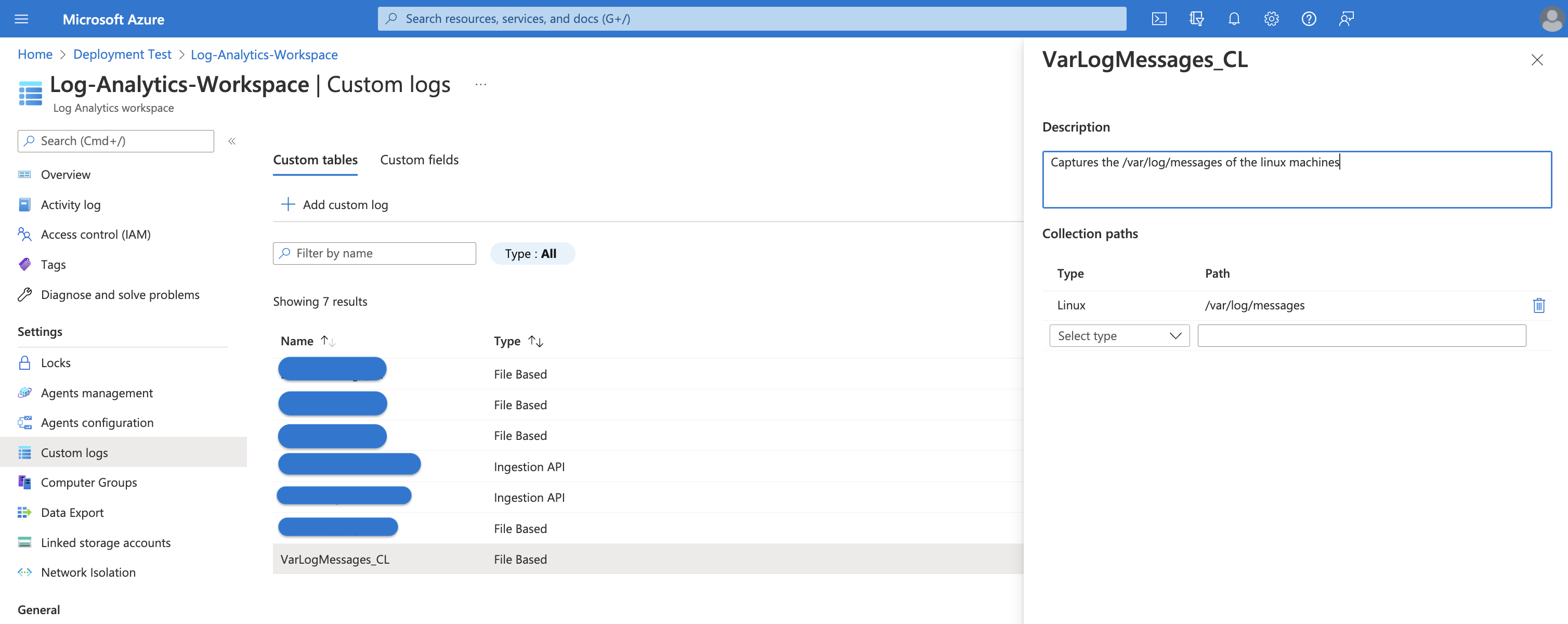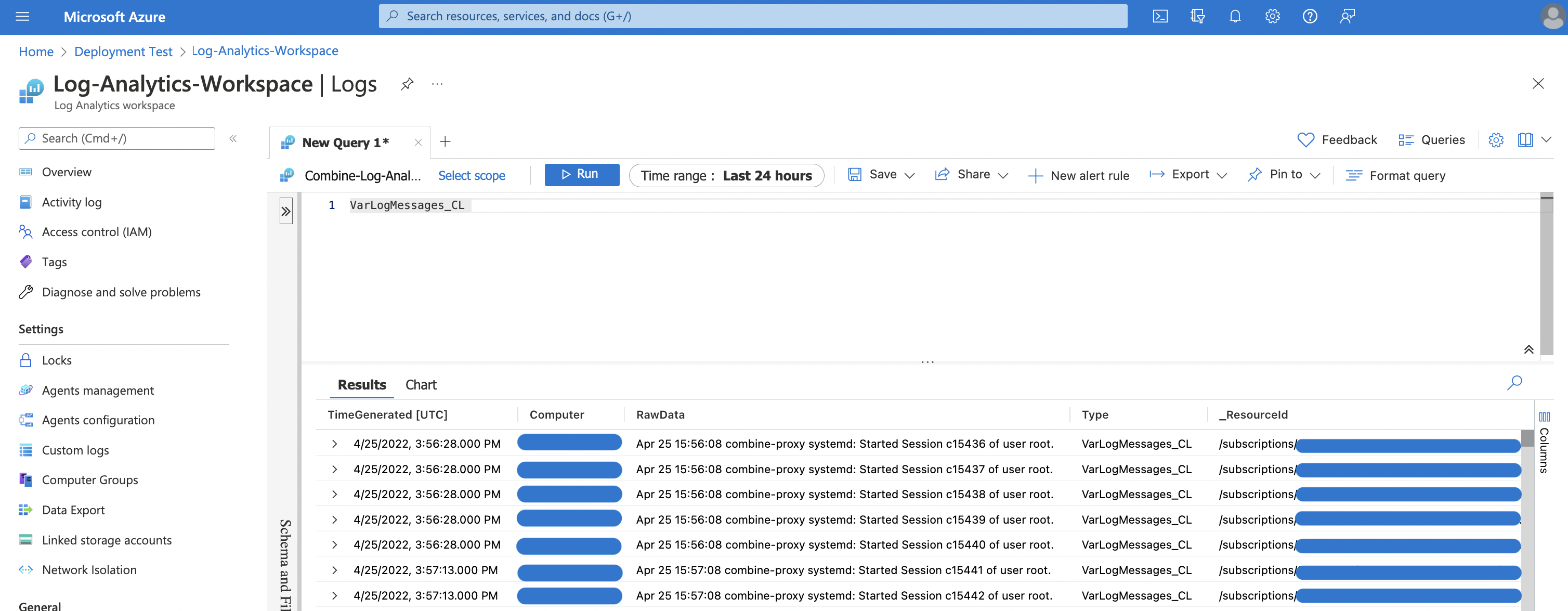
Linux VM Custom Logs with Terraform and AzApi
tagged: azapi, terraform
 Thanks to Zachary Kyra-Derksen for making this photo available freely on unsplash 🎁
Thanks to Zachary Kyra-Derksen for making this photo available freely on unsplash 🎁
I've been doing a lot of work recently on the linux side of our product's infrastructure, which consists of a few Azure VMs and VM Scale Sets.
As you can imagine, SSHing into each instance to check logs was getting to be a pain. Fortunately, it became a pain at the the right time, because shortly afterward I picked up a task to ship those logs to Azure.
This post will explain how I did that via terraform.
Some thanks are in order before we look at the code, however:
- 👉 Many thanks to Thorsten Hans, who wrote a blog post doing a similar thing for Windows machines without which I wouldn't have figured my solution out.
- 👉 Many thanks to the Azure Terraform folks who rolled out the helpful azapi terraform provider earlier this month.
For reference, we're using terraform 1.1.9 and azurerm 3.3.0.
The Need
was simple. I wanted the application and system-level logs from one VM and two VM Scale Sets to get shipped into Log Analytics, Azure's log platform.
The Setup
took a while to nail down, as it involved poking around the Azure ecosystem a bit more than I'm used to.
My pattern when terraforming Azure things has been to get it working in the Azure portal, and reverse-engineer into terraform code. I got the logs flowing by manually creating resources in the portal. To terraform it, I'd need a Log Analytics Workspace with some Custom logs, and a couple agent(s) running on each box.
Note that the Custom Log is called a Data Source in Azure parlance.
Let's assume the following variables:
var.location: the location
var.resource-group-name: the resource group name
The Workspace was easy to set up, as the azurerm docs are straightforward:
# log-analytics-workspace.tf
resource "azurerm_log_analytics_workspace" "Log-Analytics-Workspace" {
name = "Log-Analytics-Workspace"
location = var.location
resource_group_name = var.resource-group-name
sku = "PerGB2018"
retention_in_days = 30
Custom Logs, however, are not configurable via the azurerm provider. See this thread for the back-and-forth between hashicorp and microsoft folks. I began dusting off my "shell it out" pun until I discovered that the Azure folks working on infrastructure things published the azapi provider, which allows for managing resources not yet supported in azurerm .
The azapi_resource accepts a json object of properties that should match the ARM template of the resource you're trying to create. So I exported the ARM template of the Log Analytics workspace (which is the parent_id of the custom log), hoping to find the ARM template of the custom log in there. Unfortunately, I was greeted with this error:

A foray into the MSFT docs led me to a page of templates, this one being what I was looking for:
{
"apiVersion": "2020-08-01",
"type": "dataSources",
"name": "[concat(parameters('workspaceName'), 'armlog_newline')]",
"dependsOn": [
"[concat('Microsoft.OperationalInsights/workspaces/', '/', parameters('workspaceName'))]"
],
"kind": "CustomLog",
"properties": {
"customLogName": "armlog_newline",
"description": "this is a description",
"inputs": [
{
"location": {
"fileSystemLocations": {
"linuxFileTypeLogPaths": [ "/var/logs" ],
"windowsFileTypeLogPaths": ["c:\\Windows\\Logs\\*.txt"]
}
},
"recordDelimiter": {
"regexDelimiter": {
"pattern": "\\n",
"matchIndex": 0,
"numberdGroup": null
}
}
}
],
"extractions": [
{
"extractionName": "TimeGenerated",
"extractionType": "DateTime",
"extractionProperties": {
"dateTimeExtraction": {
"regex": null,
"joinStringRegex": null
}
}
}
]
}
}
A bit of finagling led to this successfully-created resource:
resource "azapi_resource" "VarLogMessages-Logs-Ingest" {
provider = azapi
type = "Microsoft.OperationalInsights/workspaces/dataSources@2020-08-01" # grabbed this from template's API version
name = "VarLogMessages-Logs-Ingest"
parent_id = azurerm_log_analytics_workspace.Log-Analytics-Workspace.id
oobody = jsonencode({
properties = {
customLogName = "VarLogMessages_CL"
description = "Captures the /var/log/messages of the linux machines"
inputs = [{
location = {
fileSystemLocations = {
linuxFileTypeLogPaths = ["/var/log/messages"],
}
},
recordDelimiter = {
regexDelimiter = {
pattern = "\\n",
matchIndex = 0,
numberdGroup = null # lol MSFT typo
}
}
}
],
extractions = [
{
extractionName = "TimeGenerated",
extractionType = "DateTime",
extractionProperties = {
dateTimeExtraction = {
regex = null,
joinStringRegex = null
}
}
}
]
}
kind = "CustomLog"
})
}
I'm not sure exactly why the TimeGenerated column is necessary. I tried to do without it but got errors indicating that I needed to include it. 🤷
In order to ship the logs from the VM to Azure, you'll need to install two agents on each box - the Dependency Agent and the Monitoring Agent. I think you might be able to enforce installation of these agents via an Azure policy, but for my relatively small architecture it seemed too complicated (Azure policies, ugh...). I queried the azure cli for the latest versions of the two agents:
az vmss extension image list -p Microsoft.Azure.Monitoring.DependencyAgent -n DependencyAgentLinux -l eastus --latest -o jsonc
gives us
[
{
"name": "DependencyAgentLinux",
"publisher": "Microsoft.Azure.Monitoring.DependencyAgent",
"version": "9.10.13.19190" # this version here
}
]
And for the Monitoring Agent,
az vmss extension image list -p Microsoft.EnterpriseCloud.Monitoring -n OMSAgentForLinux -l eastus --latest -o jsonc
gives
[
{
"name": "OmsAgentForLinux",
"publisher": "Microsoft.EnterpriseCloud.Monitoring",
"version": "1.14.11" # this version here
}
]
So we can utilize the azurerm_virtual_machine_scale_set_extension resource for the agents, specifying those versions:
resource "azurerm_virtual_machine_scale_set_extension" "Logs-Monitoring-Agent" {
virtual_machine_scale_set_id = azurerm_linux_virtual_machine_scale_set.Logs-Scale-Set.id
auto_upgrade_minor_version = true
name = "Logs-Monitoring-Agent"
publisher = "Microsoft.EnterpriseCloud.Monitoring"
type = "OMSAgentForLinux"
type_handler_version = "1.0"
settings = jsonencode({
"workspaceId" = "${azurerm_log_analytics_workspace.Log-Analytics-Workspace.workspace_id}",
"stopOnMultipleConnections" = true
})
}
resource "azurerm_virtual_machine_scale_set_extension" "Logs-Dependency-Agent" {
virtual_machine_scale_set_id = azurerm_linux_virtual_machine_scale_set.Logs-Scale-Set.id
auto_upgrade_minor_version = true
name = "Logs-Dependency-Agent"
publisher = "Microsoft.Azure.Monitoring.DependencyAgent"
type = "DependencyAgentLinux"
type_handler_version = "9.10"
provision_after_extensions = [azurerm_virtual_machine_scale_set_extension.Logs-Monitoring-Agent.name]
settings = jsonencode({
"enableAutomaticUpgrade" = true
})
}
Here's a [repo with a complete working example](github repo) of the codes.
The Result
Here's our custom log in the portal after terraform provisions it. w00t!

And we can use the custom log in a KQL query to retrieve our logs.

NOTE: for the moment this seems to work only if you're logged in via the azure cli. I've submitted a github issue to figure out why the Custom Log resources aren't able to be authenticated via the standard sp provider configuration.